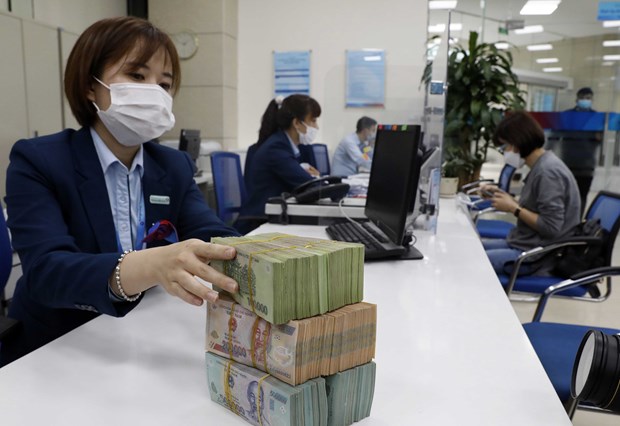Solving excess liquidity to boost credit growth
Experts believe that if credit growth is not promoted and the issue of excess liquidity in banks is not handled, the entire economy would suffer, affecting GDP growth.
Credit growth challenges
Data from the State Bank of Vietnam issued in July 2023 revealed a negative 0.74% rise in deposits from economic entities in the banking system, while deposits from individuals climbed by 8.93%. This suggests that corporations may no longer deposit money in banks, potentially owing to optimizing their capital sources, unwillingness to grow their activities, or a lack of spare funds, whilst people do the reverse.

According to Nguyen Minh Tuan, CEO of AFA Capital, despite constantly lowering interest rates, money is still coming into banks. However, credit expansion confronts significant obstacles, reflecting unfavorable economic conditions.
Deposits into the banking system that are not used can be seen in two places: interbank systems and monies kept by banks at the central bank. According to a recent BSC Securities Company research, the Citad balance (commercial banks' indefinite-term deposits kept at the State Bank) has approximately 400,000 billion VND, while the necessary reserves are roughly 280,000 billion VND.
"It is obvious that when credit growth slows down, overall liquidity in the economy decreases." If credit growth is not promoted and the issue of 'extra money' in banks is not handled, the entire economy would suffer, affecting GDP growth," Mr. Tuan said.
Loosening the money supply
To solve the "excess liquidity" problem, AFA Capital's CEO proposes that the central bank take money from the banking sector through bond activity.
As of September 21, the State Bank has withdrawn about 150,000 billion VND via bond channels. However, this change had no significant influence on interbank interest rates; interest rates did not rise appreciably. The State Bank's purpose in removing excess liquidity from the economy is to avoid problems with exchange rates and money flows by channeling it back into the market.
Many experts believe that in order to encourage credit development, there should be an emphasis on increasing borrowing, particularly improving enterprises' ability to absorb capital. Customers and businesses must be able to restart production and consumption activities, restoring the market's capacity to consume commodities and products.
Nguyen Tri Hieu, a financial expert, advises creating a national credit guarantee fund to provide guarantee services to enterprises that lack sufficient collateral throughout the borrowing procedure. Many nations, including the United States, South Korea, India, Thailand, Malaysia, and the Philippines, have successfully implemented this concept.
"I believe it is not difficult to establish a national credit guarantee fund; we must execute and control it rigorously." Businesses and banks merely need to apply to the fund for loan guarantees. Once accepted, the bank extends credit to the company, and the company pays fees to the guarantee fund. If the company fails, the fund will compensate the bank," Mr. Hieu explained.

Furthermore, Nguyen Huu Huan, a lecturer at Ho Chi Minh City University of Economics, believes that the government should pay greater attention to fiscal measures while remaining relaxed. Currently, a 2% VAT cut is insufficient to encourage people to purchase, especially because several nations exempt or drastically decrease VAT, personal income tax, and corporate income tax. To properly promote market demand, these taxes must be consistently exempted or significantly lowered, stimulating economic consumption and encouraging enterprises to create and trade.
Deputy Minister of Finance Cao Anh Tuan revealed on October 13 during a meeting with Vietnamese entrepreneurs on the occasion of Vietnam Entrepreneurs' Day that the Ministry of Finance is closely monitoring the situation in order to propose applicable solutions for 2024, such as continuing to consider reducing the environmental protection tax applied in 2023, reviewing and reporting to the government for further VAT reductions, and reviewing the application of reduced import-exposure.








